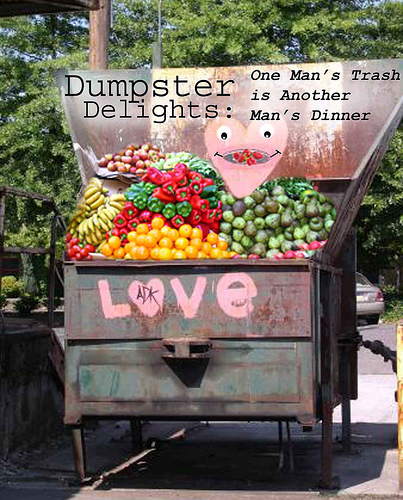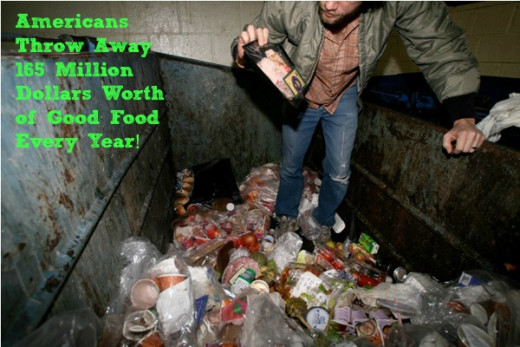Americans Throw Away 165 Billion Dollars Worth of Good Food Every Year Because of Sell-by Dates!
Perfectly Good Food Is Thrown Away Daily While People Go Hungry In the U.S.
How many of you are aware that grocery stores discard perfectly good food and then have their employees pour bleach or some other poisonous chemical over the food so that poor and homeless people will not take the food out of the dumpsters for themselves?
This is part of the war on poor and homeless people. It may not be the intention of these stores to make things worse for poor and homeless people, but that is the end result.
Is there anyone who really believes it is moral to throw perfectly good food in the garbage and then ruin it to make sure no hungry person benefits from it? A person who would not purchase it in the first place? A person or persons that would not purchase the food because they have no money or Food Stamps to do so.
The excuse stores give for throwing away so much food, some with “sell by” dates that are not yet expired, and then destroying the food with chemicals or locking the dumpster is because of liability and tax concerns. That is their excuse for not donating the perfectly good food to soup kitchens or homeless shelters also.
Someone suggested to me in the course of writing this hub that laws require these stores to handle discarded food the way they do, so I researched it. There are no state or federal laws requiring that discarded food be destroyed or locked up.
Did you know there are more than 60,000 veterans who are homeless? Many of them are among the dumpster divers. That is the thanks they get for serving their country.
Good Food Thrown Away Needlessly

165 Billion Dollars Worth of Good Food is Thrown Away Annually in the USA. YES, That Is Billion with a B.
Andrew Lam, writing for Huffpost Green writes that the average family of 4 in the U.S. throws away $2,200 worth of food every year. Lam reports that the people of this country throw away close to 40% of our perfectly good food every year and that is estimated to be about 165 BILLION dollars worth of perfectly good food thrown in the trash in this country every year.
Yet we have hungry people in this country and all over the world who could make good use of that food.
Reuters agrees with the above statistics and reports, “Just a 15 percent reduction in losses in the U.S. food supply would save enough to feed 25 million Americans annually. It also would lighten the burden on landfills, where food waste makes up the largest component of solid waste, according to the NRDC [Natural Resources Defense Council, a food and agriculture program], a nonprofit environmental organization.”
40% of America's Food Is Thrown Away Every Year -- under 3 mins
Tons of Food Are Wasted Daily In the USA -- 9 mins
Which Foods Most Often End Up In the Landfill?
What makes up the food waste? Fresh fruits and vegetables from grocery stores, packaged foods that have reached or passed the “sell by” date, which according to WebMD does not mean the food is no longer good, but that the quality (appearance) may not be as good after that date.
Most foods are good for 4 or more days beyond the “sell by” date. Some remain nutritious and safe to eat for several months and even years after that date depending on how they have been processed. Also, restaurant portions that are too large often do not get eaten and end up in the trash.
How to Understand Food Safety Dates and Expiration Dates
"Sell by" date. The labeling "sell by" tells the store how long to display the product for sale. The issue is quality of the item (freshness, taste, and consistency) rather than whether it is on the verge of spoiling. "Sell by" date is the last day the item is at its highest level of quality, but it will still be edible for some time after.
"Best if used by (or before)" date. This refers strictly to quality, not safety. This date is recommended for best flavor or quality. It is not a purchase or safety date
"Born on" date. This is the date of manufacture and has been resurrected recently to date beer. Beer can go sub-par after three months. "It is affected by sun. The light can reactivate microorganisms in the beer. That's why you have to be especially careful with beer in clear bottles, as opposed to brown or green.
"Guaranteed fresh" date. This usually refers to bakery items. They will still be edible after the date, but will not be at peak freshness.
"Use by" date. This is the last date recommended for the use of the product while at peak quality. The date has been determined by the manufacturer of the product.
The only food items required by federal law to be labeled for expiration are infant formula and some baby foods. Some states also require pulling dairy products from store shelves on the expiration date. Otherwise putting sell-by or use-by dates is all voluntary on the part of the manufacturer.
The Above information is from WebMd. You can access it by copying and pasting the URL for WebMd in my reference section below.
Tons of Good Food Thrown Away Daily in America

How Long Are Foods Generally Good?
WebMD says experts say the following about how long foods are good:
Milk – for about a week after the “sell by” date.
Meat, or pork, etc. -- 3-5 days. Personally, I would go with the 3 days and even that may be stretching it – just reporting my personal experience with it. Within 3-5 days you need to cook or freeze the meat or any food you have included the meat in.
Poultry or seafood is good for about 2 days. It should be frozen or cooked within that time period.
Eggs – if purchased before the “sell by” date should be good for 3-5 weeks. I have often used them for much longer with no ill affects. Much depends on whether or not you keep your refrigerator cold enough. It should be just short of freezing the milk, etc.
Where You Store Your Food Matters
Even dry, canned, or bottled foods should be stored in a dry, dark place at a temperature of around 50-70 degrees as much as possible prior to opening.
Refrigerated or frozen foods should be moved from the store to your refrigerator/freezer as quickly as possible.
Acidic foods like tomatoes and tomato sauce, etc., should be good for 18 months or longer if unopened. Green beans and other similar canned foods (low-acid) can be good for 5 years or more.
Cans that are bulging should be discarded and anything they’ve touched should be disinfected. Wash your hands well after handling them. Never buy canned foods that are bulging.
Never purchase damaged packages or packages with holes in them because you do not know what may have gotten into them, if they have gone stale, if someone has tapered with them, if they have become freezer burned, or a host of other issues.
Once a food product has been frozen and if it is kept frozen, the “use by” date or any other date are irrelevant. The freezing process negates that date.
Take the time to learn about food expiration dates to save money and to keep yourself and your family safe.
More From Au Fait and Friends About Food, Hunger, and Poverty
- It Is Against the Law to Be Homeless or To Help Homeless People In the USA! The Meanest Cities In th
Dozens of cities across the U.S. have made it against the law to be poor or to help poor people. More cities are passing similar laws all the time. Should charities be outlawed in America? - Who Are the Homeless People of America?
Learn who the homeless people in this country are and how much our public assistance programs are costing. The truth may surprise you. - Poverty Kills More People Every Year Than Either Of the Top Killers -- Heart Disease or Cancer
Poverty kills more people every year than any other cause and contributes to even more deaths. Why doesn't anybody care? - Hungry Children|| Our Children are Hungry
If even one child goes to bed hungry in our country, in any country, then steps must be taken to insure an end to it. It is not somebody else's job...it is OURS...yours and mine to help feed them.
Sources
http://www.webmd.com/a-to-z-guides/features/do-food-expiration-dates-matter
The Atlantic
http://www.theatlantic.com/health/archive/2012/06/is-it-ok-to-stretch-a-dollar-by-keeping-your-food-past-the-expiration-date/258415/
Andrew Lam
http://www.huffingtonpost.com/andrew-lam/waste-more-want-more_b_1825759.html
Reuters Food Report
http://www.huffingtonpost.com/2012/08/21/food-waste-americans-throw-away-food-study_n_1819340.html
More Information About Food from Au Fait and Friends
- Why is there Food Starvation in America?
Story of a child who touched my life in a special way with regard to being hungry. We all need to do our part to eradicate hunger wherever it exists! - Foods That Fight Off Disease and Mental Decline
Advice from Dr. Oz about which 4 foods he considers superfoods for fighting Alzheimer's disease. Also, a list of delicious foods proven to help you get healthy and stay healthy along with the benefits each one provides. - Diet Drinks Can Make You Fat!
Research is piling up that diet drinks and artificial sweetners can make you fat. Artificial sweetners are not the only thing that is in soft drinks that is unhealthful. - Vegetable Protein Substitutes For Meat -- How To Combine Incomplete Proteins To Make Them Complete
A list of some of the best protein substitutes for meat, a short list of how many grams of protein are in some substitutes, a list of what complimentary proteins to combine in order to make a complete protein, and a list of how many grams of protein - Pink Slime Turns Dog Food Into People Food!
Pink Slime is in our food. Pink Slime used to be used for dog foods and other animal foods. What you should know about what it is, how it is processed, what foods it is in, and why you may not want it there. Why isn't the USDA requiring it to be on f
© 2012 C E Clark







